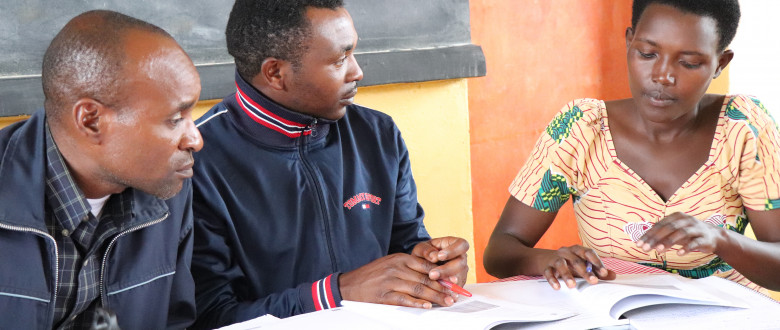
This article was written by Chantal Kabanda Dusabe, Strategic Advisor in School Leadership for VVOB in Rwanda, and originally published as a chapter in WISE ALL-IN's report "Education Reimagined: Leadership for a New Era" (2022).
There is strong consensus within the international education community that effective school leadership is key to leverage the broader education workforce for better learning and more resilient education systems. However, school leaders’ roles and responsibilities are often still too contained to administrative or supervisory activities. The shift towards instructional leadership at school level can be facilitated through the professional development of school leaders to undertake instructional leadership and by providing the necessary tools, and by strengthening decentralised educational leadership capacity.
In Rwanda, the government set out on a path in 2008 to firmly institutionalise such effective, instructional school leadership with the support of VVOB. Five important actions (in somewhat chronological order), over the course of nearly 15 years – not an unusual length of time for nationwide scaling – have led to this success and can inspire similar endeavours.
1. Set up a dedicated unit within existing structures
To consolidate and sustain progress already made in pilot projects on school management and administration before 2008, Rwanda’s Ministry of Education and VVOB began looking at how and where to set up a department responsible for school leadership more broadly. In 2011, this collaboration led to the formal establishment of the School Leadership and Management Unit within the Rwanda Basic Education Board (REB). The unit is mainly responsible for the quality of school leadership and management in basic education and, more specifically, for continuous professional development, peer learning, and the monitoring and evaluation of school leaders. A taskforce on school leadership, co-chaired by REB and VVOB, coordinates efforts of all partners in the education sector.
2. Define a common framework for ‘effective school leadership’
One of the first major accomplishments of the Unit was the formulation and introduction of evidence-based professional standards for school leaders:
- Creating strategic direction for the school
- Leading learning
- Leading teaching
- Managing the school as an organisation
- Working with parents and the wider community
These five standards describe in detail the key roles, responsibilities, functions and necessary competences to be an effective school leader. They set a common framework for the recruitment, assessment, certification and professional development of school leaders.
3. Invest in accredited professional development of school leaders and government officials
In 2013, work began on developing a system to extend professional development to school leaders and government staff at a decentralised level across the country, taking into account the abovementioned five standards.
VVOB, REB and the University of Rwanda-College of Education (UR-CE) joined forces to design two continuous professional development (CPD) modalities. These were:
- a CPD diploma course on Effective School Leadership, aimed at equipping school leaders with the competences needed to fulfil their roles. By 2021, around 3,000 school leaders had successfully completed the programme, officially accredited by UR-CE.
- additional CPD support in professional learning communities (PLCs) of school leaders, aimed at bridging the gap between the theory, policy and practice of effective school leadership, and at creating a forum for sharing good practices. By 2021, VVOB had trained close to 400 government officials at a decentralised level, to facilitate these PLCs and coach the school leaders participating in them.
4. Reach more school leaders online
As points 1 and 2 show, scaling is about more than ‘reaching numbers’. However, numbers are important, especially if the issue at hand impacts many individuals, as effective leadership does. When it comes to reaching many people, ICT mediated learning has some obvious advantages. The government of Rwanda is also keen to harness the power of ICT.
In 2019, VVOB redeveloped the original training programmes for school leaders for delivery in a blended modality by UR-CE lecturers. Future and current school leaders who want to obtain a diploma in Effective School Leadership can now learn the content online from their workplace or at home through a user-friendly interface. The limited face-to-face sessions are dedicated to deepening the understanding of the content through peer learning and interactive exercises, with offline alternatives for contexts of limited connectivity.
5. Promote distributed leadership in schools
As effective teaching is the school-based factor with the greatest direct impact on learning outcomes, VVOB and REB also look to teachers to take up leadership roles.
School-based mentors and school subject leaders, for example, are teachers selected by their peers to act as teacher leaders: they are expected to show personal leadership in professional development; they coordinate school-based CPD; they support new teachers; they stimulate reflection through lesson observations and feedback; and they are general coaches and mentors to support their colleagues in becoming better teachers. The support of the school leader for the school-based mentor remains, however, a key determinant for successful teacher leadership.
Through this trajectory of institutionalising effective school leadership at different levels, VVOB started building an evidence base to demonstrate that the model ‘works’ and to gain eminent support within Rwanda – and across the African continent.




